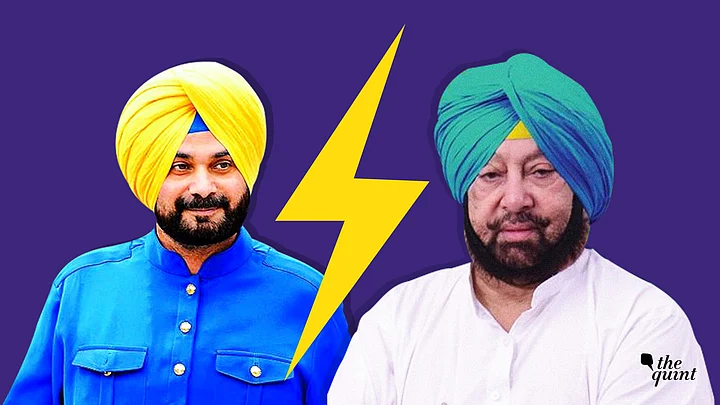Tensions between cricketer-turned-politician Navjot Singh Sidhu and Punjab Chief Minister Captain Amarinder Singh came to the fore, when the latter, in an interview to a TV channel stated, that he had advised Sidhu to reconsider his decision to attend the foundation stone ceremony of the Kartarpur Corridor on 28 November 2018, in Pakistan. Singh said that Sidhu did not get back to him on the matter.
Politics of ‘Hugging’
Earlier in August 2018, when the Punjab Minister hugged Pakistani Army Chief General Bajwa, on the sidelines of Pakistani PM Imran Khan’s swearing in, it created a furore, and the Punjab CM criticised Sidhu. The Punjab CM stated, that at a time when the Pakistan Army was killing Indian soldiers, Sidhu’s hug was uncalled for.
Differences between Sidhu and Captain Amarinder Singh are not restricted to the issue of visiting Pakistan.
Sidhu who left the BJP due to his strained ties with the Badal family has been far more aggressive on Sukhbir Singh Badal, President of the Shiromani Akali Dal (SAD, an ally of the BJP) and his brother-in-law Bikramjit Singh Majithia, a former Minister in the erstwhile SAD government. Sidhu sought the arrest of Majithia for his alleged links with drug peddlers (the Punjab minister stated that a special task force report set up by the Congress government had sufficient evidence, which pointed to Majithia’s involvement in drug peddling).
The Sidhu-Rahul-Amarinder Troika
The Punjab CM, who in his previous tenure went hammer and tongs against the Badals, has been less combative, with many, including his own party men, alleging that he has a tacit understanding with the Badals.
Even when the Ranjit Singh Commission report (set up by Captain Amarinder Singh to investigate the sacrilege of the Guru Granth Sahib in 2015, as well as the death of two peaceful protesters who died as a result of police firing) was tabled in the Punjab assembly, Sidhu took a far stronger line against the Badals, arguing that the report stated that the former CM Parkash Singh Badal had issued firing orders.
Apart from this, Sidhu is supposed to have built a strong rapport with the Congress President Rahul Gandhi which the Punjab CM is not comfortable with. Sidhu was one of the party’s star campaigners in Madhya Pradesh, Chhattisgarh and Rajasthan. It is pertinent to point out, that Captain Singh and Rahul Gandhi do not share the best of ties.
Amarinder Singh and Pakistan
Captain Amarinder is being hailed for his decision to decline the Pakistani invitation for attending the foundation stone ceremony of the Kartarpur Sahib. Captain Singh has cited terrorism emanating from Pakistan, as well as the role of the Pakistani Army in the same as the reason for his decision.
Captain Singh himself had cordial ties in his previous tenure as CM, with Chaudhry Pervaiz Elahi, who is the current speaker of the Punjab Assembly (Pakistan) and was then Punjab CM.
Elahi’s family is known for his proximity to the Pakistan Army as well as the ISI. Captain Singh visited Pakistan in 2005 and held the all Punjab games in December 2004. Significantly, during the 1980’s, the Elahi’s had links with a number of Khalistani activists and some analysts had criticised Captain Singh for going overboard in his outreach to Pakistani Punjab inspite of the above factors. Captain Amarinder Singh during his Pakistan visits has also cultivated strong personal friendships with individuals known to have close links with the Pakistani ‘Deep State’.
Why Did Amarinder Singh Decline Pakistani Invitation?
The reasons for Captain Amarinder Singh’s decision to decline the Pakistani invitation thus are not driven solely by any principles or conviction.
While Captain Singh’s decision and aggressive statements do no harm to burnish his nationalist credentials and his tough stance when it comes to national security, it is a bit naive to overlook other factors for Singh’s latest moves.
One important factor could be that Navjot Singh Sidhu has stolen the limelight in the context of the Kartarpur issue.
(Tridivesh Singh Maini is a New Delhi-based Policy Analyst associated with The Jindal School of International Affairs, OP Jindal Global University, Sonipat, India. The views expressed above are the author’s own. The Quint neither endorses nor is responsible for the same.)
